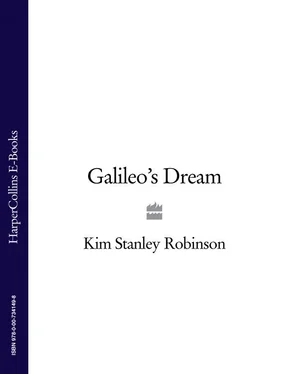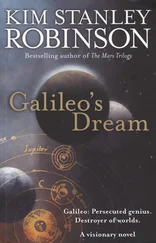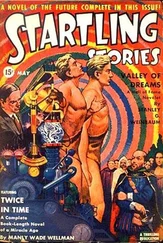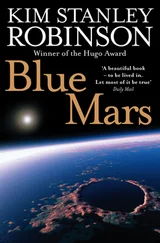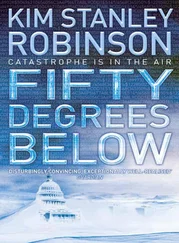‘Maybe so,’ Galileo allowed. He liked the idea of the Lincean Academy very much. To get out from under the thumb of the universities and all their Peripatetics, to elevate mathematics and natural philosophy to the highest level of thought and inquiry; it was a great new thing, a way forward. A new kind of institution, and a potential ally too.
Later that day Cesi hosted a dinner to introduce Galileo to the rest of the Lynxes. The party took place on top of the Janiculum, the highest of the Roman hills, in the vineyard of Monsignor Malvasia. The Lincean membership and a dozen other likeminded gentlemen assembled while it was still day, for the views from the Janiculum over the city were unobstructed in all directions. Among the guests were the foreign Linceans Johann Faber and Johann Schreck from Germany, Jan Eck from Holland, and Giovanni Demisiani from Greece.
Galileo trained his glass first on the basilica of St John Lateran, across the Tiber at a distance of about three miles, adjusting it until the chiselled inscription was legible on the loggia over the side entrance. It had been placed there by Sixtus V in the first year of his pontificate:
Sixtus
Pontifex Maximus
anno primo
Everyone was startled, as usual. When they had all looked through the occhialino more than once, and read and re-read the distant inscription, several toasts were proposed and drunk down. The group grew raucous, even a little giddy; Cesi’s musicians, sensing the spirit of the moment, played a fanfare on horns they pulled out from beneath their chairs. Galileo bowed, and while the brassy music played on, turned his glass on the residence of the Duke of Altemps, on a hill in the first rise of the Appenines, far to the east of them. When he had it fixed the Linceans again crowded round, taking turns counting the windows on the façade of the great villa, some fifteen miles away. This made people stark amazed, and the Janiculum rang with cheers.
Later that night, after a great deal of eating and drinking and talk, and a brief look at the moon, which was too full to see through the glass as other than a white blaze, Demisiani the Greek sat down by Galileo and leaned into him.
‘You should name your device with a new Greek word,’ he said, his saturnine face alive with the humour of his suggestion, or the fact that he was the one making it. ‘You should call it a telescope.’
‘Telescopio?’ Galileo repeated.
‘To see at a distance. Tele scopio, distance seeing. It’s better than perspicillum, which means merely a lens after all, or visorio, which is only to say visual or optical. And occhialino is petty somehow, as if you wanted only to spy on someone, it’s too small, too provincial, too Tuscan. The other languages will never use it, and will have to make up words of their own. But telescope all will understand and use together. As always with Greek!’
Galileo nodded. Certainly the best scientific names were always either Latin or Greek. Kepler had been calling it a perspicillum.
‘The root words are very old and basic,’ Demisiani said, ‘and the compounding method as well.’
Galileo surged to his feet and raised his glass, waited for the group to notice and go quiet. ‘Telescopio!’ he bellowed, dragging out the syllables as if calling for Mazzoleni, as if announcing the name of a champion: the group cheered, and Galileo leaned over to give the grinning Greek a hug, filled with sudden glee: of course his invention was such a new thing in the world that it needed a new name! No mere occhialino this!
‘TEL ESCOPIO!’ Who knows how many of the surrounding hills of Rome heard the party shouting out the new word. Galileo alone could have been heard halfway to Salerno.
The very next day,word came: the Pope wanted to see him.
An audience with Pope Paul V. The routine at the Palazzo Firenze took on a slightly frenzied air. Sleep was difficult. Galileo didn’t even try, but watched Jupiter and considered what was to come, and so slept eventually. He woke early, before sunrise, and took a slow dawn walk in the formal garden among the statues. He performed his ablutions, ate a small meal. Perhaps on this day it was even smaller than usual. Then Cartophilus and Giuseppe helped him dress in his best clothes, choosing the darker and more formal of his two dress jackets, which were getting a lot of wear on this visit.
Niccolini came by while he was completing his toilet, to discuss the audience, and to tell him all the latest from the Avvisi, Rome’s broadsheet of rumour and gossip, concerning His Holiness’s activities the previous week and what seemed to be on his mind. Like everyone else, Galileo already knew the Pope’s background: he had been Cardinal Camillo Borghese, a heretofore obscure member of that most powerful and dangerous of families, a canon lawyer whose election as Pope was so unlooked-for that he himself considered it an intercession of the Holy Ghost, and all his subsequent pontifical actions therefore divinely intended. This included the hanging of one Piccinardi, who had been so remiss as to write (though not to have published) an unauthorized biography of Paul’s predecessor, Clement VIII. That had set a tone that no one forgot.
Niccolini did not remind Galileo of that particular example of Paul’s severity, but made the point in more roundabout ways. The pontiff, he warned, was rigid, headstrong, peremptory; in these difficult years of the Counter-Reformation, he brooked no deviation from the rules and tactics laid out by the Council of Trent half a century before. In short, a pope. ‘He has grown a bit fat with papal power, in the usual way,’ Niccolini concluded.
The audience was held at the Villa Malvasia, where Galileo had been only the night before. This was the Pope’s idea; he wanted to get away from the Vatican. Niccolini led Galileo into the villa’s giant antechamber, and there introduced him to Paul V, using rather stiff and nervous phrases.
The Pope was indeed fat, an immense man, nearly spherical under his red robes, his neck fleshy and as thick as his head, his piggish eyes deep in thick folds of skin. He had a triangular goatee. Galileo knelt before him and kissed the offered ring, murmuring the prayer of obeisance Niccolini had taught him to use.
‘Rise,’ Paul said gruffly, interrupting him. ‘Speak to us standing.’
This was a great honour. Holding his features steady, Galileo got to his feet with the least clumsiness he could manage, then bowed his head.
‘Walk with us,’ Paul said. ‘We wish to take a turn in the garden.’
Galileo followed the Pope and walked with him, Niccolini and a clutch of papal assistants and servants trailing behind. They wandered through the hilltop’s vineyard, already well known to Galileo, and as he grew used to the big man’s blunt manner, and his slow gait, he grew more comfortable. He seemed to forget the stiletto sticking in and out of Paolo Sarpi’s head, and spoke as if to God Himself. Mostly he talked about the joy of seeing new stars in the sky, and of the blessing it was to witness the new powers now given to man by God.
‘Some speak of theological problems arising from the new discoveries,’ Galileo said calmly, ‘but really these problems are not possible, as creation is all one. God’s world and God’s word are necessarily the same, both being God’s. Any apparent discrepancies are only a matter of human misunderstanding.’
‘Of course,’ Paul said shortly. He did not like theology. He waved these problems aside as if they were the bees humming in the vineyard. ‘You have our support in this.’
After that Galileo spoke of other things, billowing on this pronouncement like a sail filled with the wind. He became less serious, more his usual courtier self. Then, after three quarters of an hour of this slow stroll through the vines, Paul glanced back at his secretaries and simply walked away, down to his litter at the front of the villa.
Читать дальше
